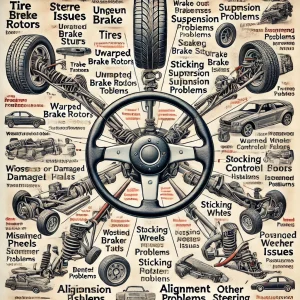Have you ever felt a sudden shake in your steering wheel while cruising the highway? It can be an unsettling experience, especially if you’re unsure what’s causing it. Whether you’re a frequent commuter, a car enthusiast, or a novice driver, understanding why your steering wheel shakes when driving is crucial for safety and comfort.
This guide explores various causes behind steering wheel shakes when driving, how to diagnose them, and practical solutions to fix the issue. From tire problems to brake issues, we cover everything you need to know to keep your driving smooth and safe.
| More to Explore for You Interest: You Might Also Enjoy to Read | |
| 1 | Steering Wheel Shakes When Braking: 5 Great Truths You Need |
| 2 | How to unlock steering wheel without key: 5 Proven Ways |
| 3 | Subaru Steering Wheel Locked: Wonderful Truth of 2024 Revealed Now |
What Causes Steering Wheel Shakes When Driving?
Tire Issues
- Uneven Tire Wear: Uneven tire wear is one of the most common reasons for a shaky steering wheel. It can cause the vehicle to wobble, especially at high speeds. This often happens due to improper tire rotation, misaligned wheels, or worn-out suspension components. Regularly checking your tyres and ensuring they wear evenly can prevent this issue and reduce the instances.
- Unbalanced Tires: Unbalanced tires can lead to steering wheel shakes while driving, particularly at higher speeds. When the weight distribution on your tyres is uneven, vibrations travel up through the steering system. Balancing your tyres can quickly fix this problem, ensuring equal weight distribution and smoother driving.
- Tyre Pressure Problems: Incorrect tyre pressure can cause your steering wheel to shake. Overinflated or underinflated tyres can lead to uneven contact with the road, resulting in vibrations. Regularly checking and maintaining the correct tyre pressure is essential for a smooth and comfortable ride.
Brake Problems
- Warped Brake Rotors: When your brake rotors are warped, it can cause the steering wheel to shake, especially when braking at high speeds. Warped rotors create uneven surfaces for the brake pads to press against, leading to vibrations. Replacing or resurfacing the warped rotors will resolve this issue and restore smooth braking.
- Worn Brake Pads: Worn-out brake pads can also contribute to steering wheel shakes. When the brake pads are too thin, they may not properly contact the rotors, resulting in vibrations. Regularly checking and replacing worn brake pads can prevent this problem and ensure safe braking.
- Sticking Brake Calipers: Sticking brake callipers can cause steering wheel shakes when driving by applying uneven pressure to the brake pads. This creates an imbalance and leads to vibrations. Servicing or replacing the brake callipers can resolve this issue and improve your vehicle’s braking performance.
Suspension Issues
- Worn-Out Shocks and Struts: Shocks and struts play a crucial role in absorbing road impacts and maintaining vehicle stability. When they wear out, it can lead to steering wheel shakes, especially on bumpy roads. Replacing worn shocks and struts is essential for a smooth and stable ride.
- Damaged Control Arms: Control arms connect the vehicle’s suspension to the frame, allowing smooth movement and steering. When they are damaged or worn, the steering wheel can shake. Inspecting and replacing damaged control arms will resolve this issue and improve your vehicle’s handling, eliminating steering wheel shakes.
- Loose or Damaged Tie Rods: Tie rods connect the steering gear to the wheels. When they become loose or damaged, they can cause steering wheel shakes and poor handling. Replacing or tightening the tie rods will fix this problem and ensure precise steering.
Alignment Problems
- Misaligned Wheels: Wheel alignment is crucial for stable and smooth driving. Misaligned wheels can cause the steering wheel to shake, especially at higher speeds. Regular wheel alignment checks and adjustments will prevent this issue and improve your vehicle’s handling, reducing steering wheel shakes while driving.
- Bent Axles: Bent axles can result from accidents or hitting large potholes and can cause the steering wheel to shake. This issue requires professional Inspection and repair to restore smooth driving and ensure safety, eliminating this problem.
Other Mechanical Issues
- Engine Problems: Engine problems, such as misfires or worn-out engine mounts, can cause vibrations that travel up to the steering wheel. Addressing these engine issues through regular maintenance and repairs will resolve the shaking and improve overall vehicle performance, preventing this issue.
- Power Steering Issues: Problems with the power steering system, such as low fluid levels or worn-out components, can also cause this . Ensuring proper maintenance of the power steering system and addressing any issues promptly will prevent this problem and enhance steering performance.
How to Diagnose Steering Wheel Shakes When Driving
Symptom Identification
- Shakes During Acceleration If your steering wheel shakes when accelerating, it could be due to unbalanced tires, worn-out suspension components, or engine problems. Identifying the specific symptom helps narrow down the possible causes and find the appropriate solution, preventing this .
- Shakes During Braking Steering wheel shakes when driving and braking are often caused by warped brake rotors or worn-out brake pads. Focusing on these components during diagnosis will help resolve the issue quickly and effectively.
- Shakes at High Speeds Steering wheel shakes at high speeds are commonly due to unbalanced tires, misaligned wheels, or suspension issues. Addressing these areas will restore smooth driving at higher velocities and eliminate this.
- Shakes at Low Speeds Shakes at low speeds can result from various issues, including worn-out shocks and struts, loose tie rods, or engine problems. Proper diagnosis will help identify the root cause and implement the necessary repairs, preventing this.
Diagnostic Tools and Techniques

- Visual Inspection A thorough visual inspection of the tires, brakes, suspension components, and steering system can reveal obvious signs of wear or damage. This initial step helps identify potential issues that may be causing the steering wheel shakes.
- Test Driving Test driving the vehicle allows you to experience the symptoms firsthand and observe when and how the steering wheel shakes. This information is invaluable for diagnosing the problem and determining the appropriate solution.
- Professional Diagnostic Tools Professional diagnostic tools, such as wheel alignment machines and brake rotor measurement devices, provide precise data on the condition of your vehicle’s components. Utilizing these tools ensures accurate diagnosis and effective repairs, eliminating steering wheel shakes when driving.
Common Scenarios and Their Diagnosis
- Case Study: Shake During Braking Samantha experienced steering wheel shakes when driving and braking at high speeds. An inspection revealed warped brake rotors. Replacing the rotors and brake pads resolved the issue, providing a smoother driving experience.
- Case Study: Shake at High Speeds John noticed his steering wheel shaking at higher speeds. After consulting a mechanic, it was determined that the issue was due to uneven tire wear. The tires were realigned and replaced, and the steering wheel shakes while driving ceased.
Solutions to Fix Steering Wheel Shakes When Driving
Tire-Related Fixes
- Balancing Tires Balancing the tires ensures even weight distribution, reducing vibrations and steering wheel shakes when driving. Regular tyre balancing is essential for a smooth and comfortable ride.
- Rotating Tires Rotating the tires helps ensure even wear, preventing uneven tire wear that can cause steering wheel shakes driving. Regular tire rotation is a simple yet effective maintenance task.
- Replacing Worn Tires Worn-out tires can cause steering wheel shakes when driving due to uneven contact with the road. Replacing worn tires with new ones will resolve this issue and improve driving stability.
Brake-Related Fixes
- Resurfacing or Replacing Brake Rotors Warped brake rotors can be resurfaced or replaced to eliminate vibrations and steering wheel shakes when driving. This ensures smooth and safe braking.
- Replacing Brake Pads Worn-out brake pads can cause vibrations. Replacing them with new pads will restore proper braking performance and eliminate steering wheel shakes when driving.
- Servicing Brake Calipers Sticking brake calipers can cause uneven pressure on the brake pads, leading to vibrations. Servicing or replacing the brake calipers will resolve this issue and improve braking performance, preventing steering wheel shakes when driving.
Suspension-Related Fixes
- Replacing Shocks and Struts Worn-out shocks and struts can cause steering wheel shakes when driving, especially on bumpy roads. Replacing them ensures a smooth and stable ride.
- Fixing Control Arms Damaged control arms can lead to steering wheel shakes when driving. Inspecting and replacing damaged control arms will resolve this issue and improve vehicle handling.
- Adjusting or Replacing Tie Rods Loose or damaged tie rods can cause steering wheel shakes when driving. Replacing or tightening the tie rods will fix this problem and ensure precise steering.
Alignment Fixes
- Professional Wheel Alignment Misaligned wheels can cause steering wheel shakes when driving. Professional wheel alignment ensures proper orientation and smooth driving.
- Fixing Bent Axles Bent axles can cause vibrations. Professional Inspection and repair of bent axles will restore smooth driving and ensure safety, eliminating steering wheel shakes when driving.
General Maintenance Tips
- Regular Vehicle Inspections Regular vehicle inspections help identify potential issues before they become major problems. Keeping up with scheduled maintenance can prevent steering wheel shakes while driving and other issues.
- Keeping Up with Scheduled Maintenance Staying on top of scheduled maintenance tasks, such as oil changes, tire rotations, and brake inspections, ensures your vehicle remains in optimal condition and reduces the risk of steering wheel shakes when driving.
Expert Advice on Steering Wheel Shakes When Driving

- Insights from Automotive Experts Understanding the root causes of steering wheel shakes when driving can help you diagnose and fix the problem more efficiently.
- Common Myths and Misconceptions
- Myth: Balancing tires will fix all steering wheel shakes while driving.
- Reality: While tyre balancing can help, it’s not the only solution.
- Myth: Steering wheel shakes when driving are always due to tire issues. Reality: Shakes can also be caused by problems with the brakes, suspension, or alignment.
- Myth: You can ignore minor steering wheel shakes while driving.
- Reality: Even minor shakes can indicate more significant problems that need immediate attention.
- Tips from Mechanics
- Always start with the simplest solutions, like checking tire pressure and balance.
- Use high-quality parts for replacements to ensure longevity and performance.
- Regular maintenance is key to preventing steering wheel shakes.
Conclusion:
By understanding and addressing the causes of steering wheel shakes when driving, you can maintain your vehicle’s safety and performance, ensuring a smooth and comfortable driving experience.
Additional Resources
- Owner’s Manual: This product does not have an owner’s Manual.
- Link for Helpful Vidio: Click for Vidio
- Service Centers: Visit authorized service centers for professional inspections and repairs.
- Official Website: For more information and resources, visit our official website.
- Social Media: Follow us on Facebook, Instagram, and X for the latest updates and tips.
Frequently Asked Questions:
Q No. 1: Why Does the Steering Wheel Shake When Driving?
Answer: Steering wheel shaking while driving is often caused by various mechanical issues in your vehicle. Common reasons include unbalanced tires, uneven tire wear, misaligned wheels, or worn suspension components. Brake problems, such as warped brake rotors or worn brake pads, can also cause vibrations. Engine issues, like misfires or worn-out mounts, and power steering problems may contribute to the shaking. Regular maintenance and prompt attention to these issues can prevent steering wheel shakes and ensure a smoother driving experience.
Q No. 2: Why Is My Steering Wheel Shaking at 60 mph?
Answer: If your steering wheel shakes at 60 mph, it is likely due to tire and wheel balance issues. Unbalanced tyres can cause vibrations that become more noticeable at higher speeds. Another potential cause is misaligned wheels, which can lead to uneven tire wear and shaking. Additionally, worn suspension components, such as shocks or struts, can contribute to this problem. Ensuring your tyres are balanced and wheels are properly aligned can resolve this issue.
Q No. 3: Is It Safe to Drive When Your Car Is Shaking?
Answer: Driving a car that is shaking can be unsafe, as it may indicate underlying mechanical issues that could compromise vehicle control. Steering wheel shakes can affect your ability to steer accurately, especially at higher speeds. It’s essential to diagnose and fix the root cause of the shaking promptly to ensure your safety and maintain vehicle performance. If your car starts shaking while driving, it’s best to have it inspected by a professional mechanic.
Q No. 4: Why Is My Steering Wheel Rattling When I Drive?
Answer: A rattling steering wheel can be caused by loose or damaged components in the steering or suspension systems. Common culprits include loose tie rods, worn ball joints, or faulty control arms. Additionally, problems with the steering column or power steering system can cause rattling. It’s crucial to address these issues quickly, as they can affect your vehicle’s handling and safety. A thorough inspection by a mechanic can identify and fix the problem.
Q No. 5: What Causes Your Steering Wheel to Shake While Driving?
Answer: Several factors can cause your steering wheel to shake while driving. These include:
- Unbalanced Tires: Uneven weight distribution can cause vibrations.
- Uneven Tire Wear: Improper tire rotation or alignment issues can lead to shaking.
- Brake Problems: Warped rotors or worn brake pads can cause vibrations when braking.
- Suspension Issues: Worn shocks, struts, or control arms can result in an unstable ride.
- Alignment Problems: Misaligned wheels can cause the steering wheel to shake, especially at higher speeds. Addressing these issues through regular maintenance and inspections can prevent steering wheel shakes.
Q No. 6: Is It Safe to Have Steering Wheel Shaking?
Answer: Steering wheel shaking is not safe and indicates potential problems with your vehicle that need immediate attention. It can impair your ability to control the car and may lead to more significant issues if left unresolved. Common causes include tyre imbalance, alignment issues, or worn suspension parts. Promptly diagnosing and fixing the cause of the shaking is crucial for your safety and the longevity of your vehicle.
Q No. 7: How to Fix Steering Wheel Wobble?
Answer: To fix steering wheel wobble, follow these steps:
- Check Tire Balance: Ensure your tires are balanced to prevent vibrations.
- Inspect Tire Wear: Look for uneven wear patterns and rotate or replace tires as needed.
- Align Wheels: Proper wheel alignment can resolve many shaking issues.
- Examine Brakes: Check for warped rotors or worn brake pads and replace them if necessary.
- Inspect Suspension: Look for worn shocks, struts, or control arms and replace faulty components.
- Check Steering Components: Ensure tie rods and other steering parts are secure and in good condition. Addressing these areas will help eliminate steering wheel wobble and improve your driving experience.
Q No. 8: Why Is My Car Shaking Through the Steering Wheel?
Answer: Your car shaking through the steering wheel can result from several issues, including:
- Unbalanced or Unevenly Worn Tires: These cause vibrations that transfer to the steering wheel.
- Brake Issues: Warped rotors or worn brake pads can cause shaking when braking.
- Suspension Problems: Worn shocks or struts can lead to instability and shaking.
- Wheel Alignment: Misaligned wheels can cause shaking at certain speeds.
- Engine or Power Steering Issues: Problems in these systems can also result in steering wheel vibrations. Identifying and addressing these problems promptly will help stop the shaking and ensure a smoother ride.
Q No. 9: How to Fix Steering Wheel Shake?
Answer: To fix steering wheel shake, you should:
- Balance Your Tires: Ensure even weight distribution on all tires.
- Rotate Your Tires: Prevent uneven wear by rotating tires regularly.
- Align Your Wheels: Proper alignment can prevent and fix steering wheel shakes.
- Replace Worn Tires: Worn-out tires can cause vibrations and need replacing.
- Check Brake Components: Resurface or replace warped rotors and worn brake pads.
- Inspect Suspension and Steering: Replace worn shocks, struts, and other suspension or steering components. By following these steps, you can effectively fix steering wheel shake and maintain a smooth driving experience.







Leave a Reply